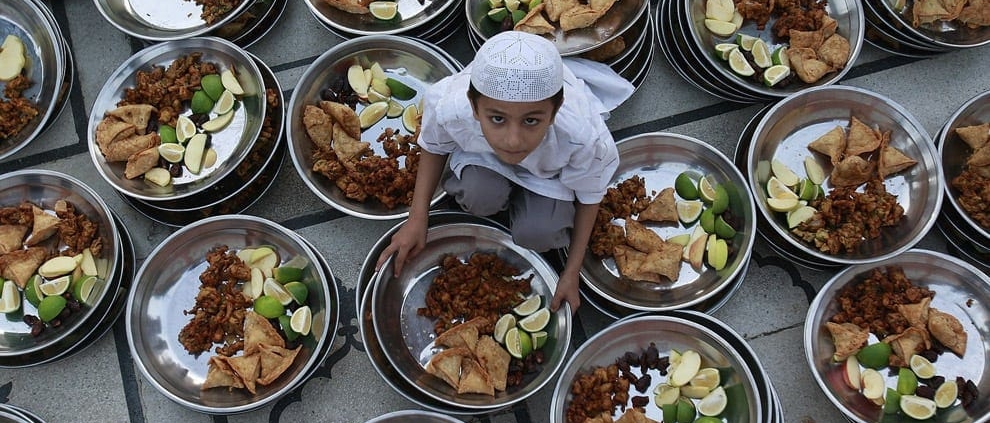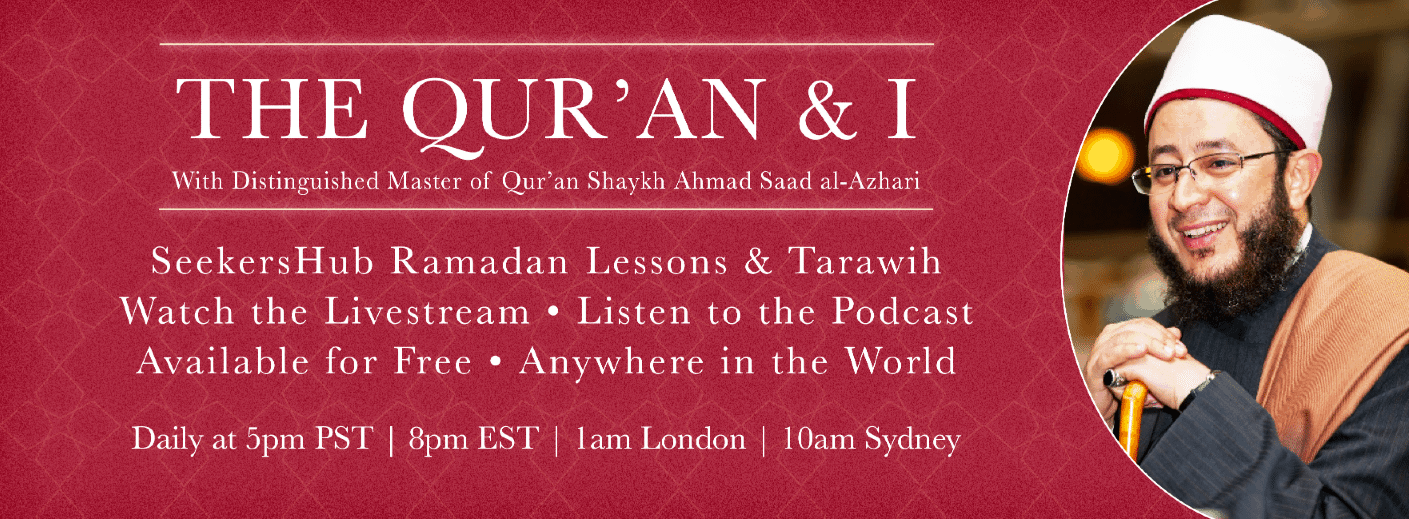Elevation of Spirit: Attitudes and Approaches to Fasting, by Shaykh Faid Muhammad Said
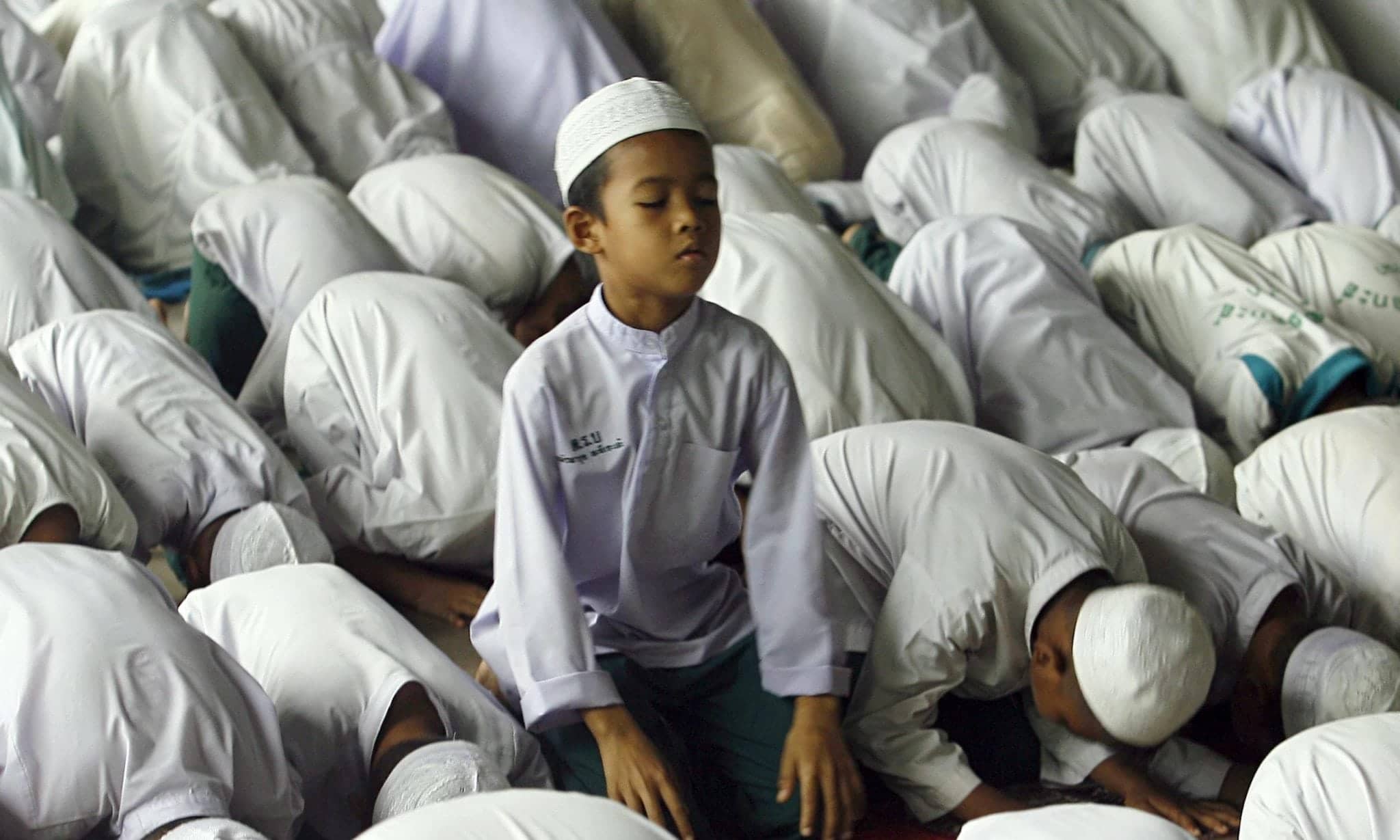 Muslims the world over will soon observe the fast of Ramadan, abstaining from all food consumption and other circumscribed activities from dawn till dusk. The annual cycle of Ramadan in the calendar continues to coincide with the longer days of summer, at least in the western hemisphere, making for a debilitating experience. But Muslims need not draw back from the prospect of physical hardship when confronted by the length of the day or the heat and humidity. That is the experience of abstention, which is the willing sacrifice of mundane comforts. It is the experience of discomfort that makes the reward all the more appreciable.
Muslims the world over will soon observe the fast of Ramadan, abstaining from all food consumption and other circumscribed activities from dawn till dusk. The annual cycle of Ramadan in the calendar continues to coincide with the longer days of summer, at least in the western hemisphere, making for a debilitating experience. But Muslims need not draw back from the prospect of physical hardship when confronted by the length of the day or the heat and humidity. That is the experience of abstention, which is the willing sacrifice of mundane comforts. It is the experience of discomfort that makes the reward all the more appreciable.
In authentic Hadith Tradition, the Prophet’s (peace be upon him) Companion Ubay ibn Kaab narrates, “There is a man, and I do not know of any who lives furthest from the Mosque than him, yet he has never missed a congregational prayer. The people said, ‘If you have a donkey you can ride by night when it is cooler or in the scorching heat of the day.’ So the man said, ‘I do not wish my house to be closest to the Mosque for I prefer the reward of walking to the Mosque. I walk to the Mosque where, on arrival, I meet Allah, Who is Appreciative. And I walk back to my house where, on returning, I meet my family, in joyous appreciation.’” And the Prophet – on him peace and blessings – said, ‘Allah has bestowed on you all those blessings.’”
Thus, hardship is in itself an achievement and the experience of hardship, the willing sacrifice of comforts, awakens the inner purpose of abstention.
In Hadith tradition again, the Companion, Aus ibn Aus, tells us, “I heard the Prophet say, ‘Whoever baths on a Friday, completing full bodily purification, and then ventures early to the Mosque and walks there, though he may have a mount to ride, and then sits close to the Imam and listens attentively, then Allah will reward him for each step of that journey equal to the reward for standing in night vigil the whole year.’” (Ahmad, Abu Dawud, An-Nasai, Ibn Majah).
And Ali ibn abi Taalib said, “It was the Prophet’s custom to walk to the eid prayer congregation.” (Tirmidhi)
These traditions speak to us about the inner meaning of sacrifice, the experience – the means of achieving closeness to Allah. For Allah takes no satisfaction from our discomfort, rather, He desires the elevation of our mind and spirit through the sacrifice of bodily comforts. There are many, young and old, able-bodied and disabled alike, that shall experience physical discomfort while Allah, knowing what they are enduring, draws them nearer to Him.
Once we are able to rethink and better understand what it means to fast, the transformation of the mind will help to change prevailing attitudes and approaches to Ramadan. The predominant sensibility of consumption in our contemporary world, whether in the west or east, means that for most Muslims the fasting experience is a tyranny of clock-time with only a few hours of relief. Time itself becomes ponderous so that the countdown to breakfast is torture for a great multitude. During the hours of fasting, relief comes in the form of “distraction” that seeks to escape the pangs of hunger, parching thirst and mental instability.
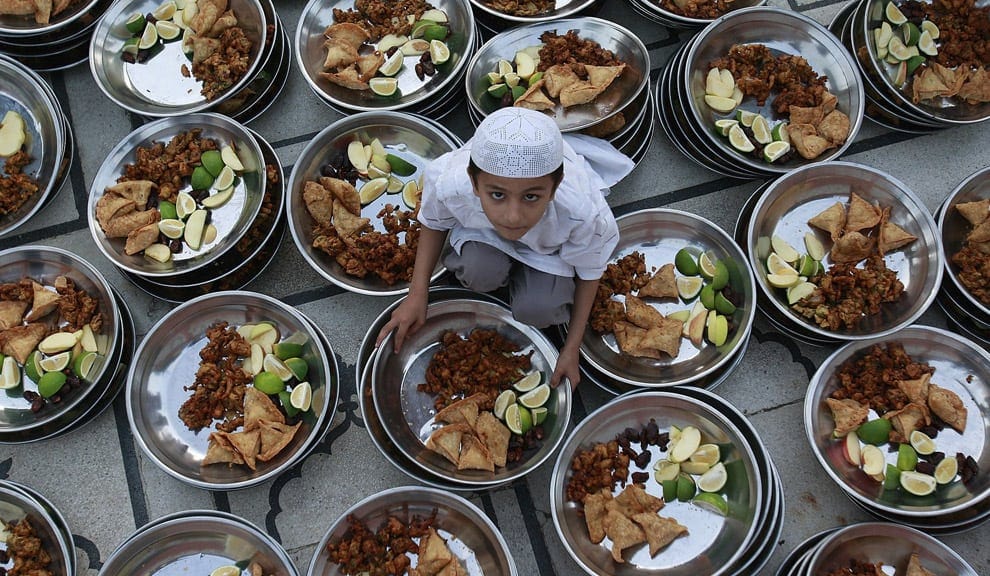 For many Muslims distraction from hunger and thirst comes, paradoxically, by increased exposure to food. Many people actually spend a significant part of the day engaged in food purchase and preparation ahead of ifthar or breakfast. In fact, the problem is not only one of exposure to food but also expenditure on food, so that instead of decrease there is increase in consumption in Ramadan.
For many Muslims distraction from hunger and thirst comes, paradoxically, by increased exposure to food. Many people actually spend a significant part of the day engaged in food purchase and preparation ahead of ifthar or breakfast. In fact, the problem is not only one of exposure to food but also expenditure on food, so that instead of decrease there is increase in consumption in Ramadan.
Welcome news for traders perhaps but the individual Muslim may well experience deficit in more than one sense. An appreciation of socio-economic dynamics helps to explain Muslims’ attitudes to fasting in the contemporary world. Muslim or non-Muslim, we are universally accustomed to enjoying at least three meals a day. Until quite recent times the greater part of humanity was accustomed to only one meal a day. This was also the case in the Muslim context for many centuries. Our three-meals-a-day privilege was not a luxury enjoyed by the famous Companions and all those who in every age have sought to emulate them. When we fast today the assumption is that the goal has been achieved simply because we have abstained from food and drink – even though that abstention is based on a false consciousness – for the very act of denial in the physical sense finds compensation in a mind filled with thoughts of food. This compensatory strategy is shaped by the dominant sensibility of our era, which is that of ever-increasing consumption. Thus, we have the contradictory phenomenon of Muslims collectively experiencing a consumptive boost in Ramadan at the very moment when the spiritual nature should be eclipsing the material nature.
Fasting becomes a debilitating physical experience only because, in losing sight of its spiritual significance, we are increasingly ill-prepared for Ramadan. Like any all-round experience involving mind, body and spirit, preparation is crucial. Everybody would be surprised if athletes were to compete in a sports tournament without a comprehensive training programme involving diet, physical activity and mental preparation, based on a keen desire to achieve success. Muslims would do well to genuinely want to emulate the Prophet – on him peace and blessings – and his Companions. Their fasting record was a before-and-after process, which emphasised advance-preparation. The Prophet – on him peace and blessings – would always make advance preparation for Ramadhan, instructing his Companions to do likewise. For them, fasting was a regular feature on Mondays and Thursdays and the middle days of each month but they would devote almost the whole of the month of Sha’ban to fasting, so that by the first day of Ramadan their minds and bodies were completely at ease and their spiritual faculty ready for elevation. Needless to say, they had absolutely no need for illusory compensations.
The Prophet – on him peace and blessings – subsumed the physical aspect of fasting under the spiritual aspect.
In the tradition narrated by Abu Huraira we are told that the Prophet – on him peace and blessings – said, “Allah says, ‘Whatever good deed you perform is for your own self but fasting is especially for Me. I Alone write the reward of fasting.’
Fasting is a shield against sins and protection from the fire… By Him in Whose Hands my soul is, the unpleasant smell that emanates from the mouth of a fasting person is better with Allah than the smell of musk. Two pleasures await the fasting person, one at the time of breaking fast and the other when they will meet their Lord.” (Bukhari, Muslim)
Since fasting is exclusively for Allah, the reward is exclusive to Him. As the most secret worship, fasting has its own gradations and hierarchies. It is between the servant and Allah, so the All-Knowing alone can distinguish between a complete fast and an empty fast. A fast driven by spiritual hunger for connection and intimacy with Allah stands in contradistinction to the limitations of physical hunger which seeks distraction from the state of fasting. Far from operating as a shield, the fast that is centred purely on physical hunger may in extreme cases lead a distracted mind to commit indiscretions.
On the other hand, the sincere fast – driven by a desire for self-annihilation – is likened to the most powerful odour imaginable, as testified by the Prophet’s oath. And there is no soul more ineffable than his – on him salutations! It is for this reason that the Imam Abu Hamid al Ghazzali categorized fasting as taking three forms.
- The lowest form is that some people abstain only from food and sexual intimacy. The only measure at this level is hunger and thirst but it rarely achieves the purpose of fasting.
- The next level is the abstention of organs from all that Allah forbids, such as the tongue from useless talk, the ears from hearing unnecessary sounds, the eyes from seeing the forbidden and so on.
- But the highest level and the most elevating is the fasting heart. When the heart is dominated by Allah alone then all thought is channelled into consciousness of the Most Merciful and the realization that abstention, with all its discomforts, is solely for absolute intimacy with Allah.
That is the purpose of fasting, absolute intimacy with the Beloved.
In this regard it is vital that Muslims recall the connection between Allah, the Prophet Muhammad – on him peace and blessings – and the month of Ramadan. By appreciating the Divine Attribute as “Salam, the Source of Peace” and His Messenger as “Mercy to the worlds”, we also appreciate Ramadan as the “month of peace” when Mercy was revealed. The Mercy of Allah is manifest in the mercy to the Creation, and through His Word, the message of peace. Abstention, always with the same purpose, was enjoined on all peoples in all times.
Thus Allah says, “O you who have attained to faith! Fasting is ordained for you, as it was ordained for those before you, so that you might remain conscious of Allah, [fasting] during a certain number of days; but whoever of you is ill or on a journey [shall fast instead for the same] number of other days, and [in such cases] it is incumbent upon those who can afford it to make sacrifice by feeding a needy person, and whoever does more good than he is bound to do does good unto himself thereby, for to fast is to do good unto yourselves – if you but knew it” (Al Baqarah, 2:183-184).
It is here that the purpose is spelled out: fasting solidifies God-consciousness. Fasting is not a test of thirst or hunger but a means to help promote intimacy with Allah, Who says, “O mankind! Worship your Sustainer Who has created you and those who lived before you so that you might remain conscious of Him.” (Al Baqarah, 2:21).
 Consciousness is stressed in both these Quran verses. Intensive worship such as fasting leads to greater consciousness of Allah. When there is heightened awareness of Allah, the devotee develops a heightened intimacy with Allah. And such intimacy must necessarily move beyond fasting of the organs to fasting of the spiritual faculty. The heart itself is an organ, of course, but by “fasting heart” we mean a spiritual state purified of every concern except intimacy with Allah. Intimacy leads to greater awareness of His merciful attributes and the realization that our return is back to Him. Quite simply, fasting should make us focus on the Hereafter. And this is sufficient to make us increase in remembrance of Allah and yearn for the Mercy of Allah.
Consciousness is stressed in both these Quran verses. Intensive worship such as fasting leads to greater consciousness of Allah. When there is heightened awareness of Allah, the devotee develops a heightened intimacy with Allah. And such intimacy must necessarily move beyond fasting of the organs to fasting of the spiritual faculty. The heart itself is an organ, of course, but by “fasting heart” we mean a spiritual state purified of every concern except intimacy with Allah. Intimacy leads to greater awareness of His merciful attributes and the realization that our return is back to Him. Quite simply, fasting should make us focus on the Hereafter. And this is sufficient to make us increase in remembrance of Allah and yearn for the Mercy of Allah.
From among the chief virtues of fasting are
- satisfaction with one’s lot in life and the life to come,
- remission of misdeeds and safeguard against excess,
- intercession on the Day of Judgement,
- entry through Ar-Ray’an, a unique gateway of Paradise reserved for those that fast and
- protection from the terror of hellfire.
Likewise, the virtues of Ramadhan are many but we do say that the greatest virtue of all is the opportunity to connect with the Quran, which is the greatest miracle brought to us by the mercy to the worlds – Muhammad, on him peace and blessings.
Allah explains this Mercy in His saying, “It was the month of Ramadan in which the Quran was [first] bestowed from on high as a guidance onto man and a self-evident proof of that guidance and as the standard by which to discern the true from the false, hence, whoever of you lives to see this month shall fast throughout it but he that is ill or on a journey [shall fast instead for the same] number of days, Allah wills that you shall have ease and does not will you to suffer hardship but [He desires] that you complete the number [of days required, and that you extol Allah for His having guided you aright and that you render your thanks [unto Him].” (Al Baqarah, 2:185).
It is for us to reach out and benefit from that Mercy. To do so we must prepare accordingly. With good preparation there will be no need for distraction. The heart will incline to spiritual purification when the mind and body are prepared in advance. To attain the benefits of Ramadan then, we must reorient our focus on the very purpose of fasting.
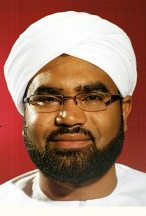 Shaykh Faid Mohammed Said was born in Asmara, Eritrea, where he studied the holy Qur’an and its sciences, Arabic grammar and fiqh under the guidance of the Grand Judge of the Islamic Court in Asmara, Shaykh Abdul Kader Hamid and also under the Grand Mufti of Eritrea. He later went to study at Madinah University, from which he graduated with a first class honours degree. In Madinah, his teachers included Shaykh Atia Salem, Shaykh Mohamed Ayub (ex-imam of the Prophet’s Mosque, peace be upon him), Professor AbdulRaheem, Professor Yaqub Turkestani, Shaykh Dr Awad Sahli, Dr Aa’edh Al Harthy and many other great scholars. Shaykh Faid has ijaza in a number of disciplines including hadith, and a British higher education teaching qualification. He is currently the scholar in residence and head of education at Harrow Central Mosque, United Kingdom.
Shaykh Faid Mohammed Said was born in Asmara, Eritrea, where he studied the holy Qur’an and its sciences, Arabic grammar and fiqh under the guidance of the Grand Judge of the Islamic Court in Asmara, Shaykh Abdul Kader Hamid and also under the Grand Mufti of Eritrea. He later went to study at Madinah University, from which he graduated with a first class honours degree. In Madinah, his teachers included Shaykh Atia Salem, Shaykh Mohamed Ayub (ex-imam of the Prophet’s Mosque, peace be upon him), Professor AbdulRaheem, Professor Yaqub Turkestani, Shaykh Dr Awad Sahli, Dr Aa’edh Al Harthy and many other great scholars. Shaykh Faid has ijaza in a number of disciplines including hadith, and a British higher education teaching qualification. He is currently the scholar in residence and head of education at Harrow Central Mosque, United Kingdom.
Resources for Seekers: The Ramadan Reader: A Guide to Fasting, Prayer, Qur’an, and Spirituality in the Month of Ramadan
Join SeekersHub for Ramadan 2015 in Toronto or plug in online from wherever you are in the world. Find out more here.
